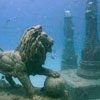Atlantean Society
 Dweller on Two Planets is one of the most important texts of the 19th Century Atlantis canon. The book was ‘channeled’ by Frederick S. Oliver. Oliver was born in Washington D.C. in 1866 and came to Yreka, California, with his parents when he was two years old. Yreka is just north of Mount Shasta, a huge dormant volcanic peak in Northern California. Gives a depiction of the high technology of Atlantis.
Dweller on Two Planets is one of the most important texts of the 19th Century Atlantis canon. The book was ‘channeled’ by Frederick S. Oliver. Oliver was born in Washington D.C. in 1866 and came to Yreka, California, with his parents when he was two years old. Yreka is just north of Mount Shasta, a huge dormant volcanic peak in Northern California. Gives a depiction of the high technology of Atlantis.
Oliver started to write this book at the age of eighteen, in 1883-4, while surveying the boundaries of his family’s mining claim. He found himself uncontrollably in his notebook. He ran home in terror, where he sat down and let his hand write. These automatic writing spells continued for several years; he would write a few pages at a time. He completed writing this book in 1886, and died at the age of 33 in 1899.
A Dweller on Two Planets was finally published in 1905, by his mother Mary Elizabeth Manley-Oliver.
Extracts, giving a picture of the society of Atlantis:
“Atlantis, or Poseid, was an empire whose subjects enjoyed the freedom allowed by the most limited monarchical rule, The general law of official succession presented to every male subject a chance for preferment to office. Even the emperor held an elective position, as also did his ministers, the Council of Ninety, or Princes of the Realm (p26)
*
“The possession of the elective power was vested in the two great social divisions, which embraced all classes of people, of either sex.
The two major social branches were known by the distinctive names of “Incala” and “Xioqua,” or, respectively, the priesthood and scientists. Every person had the option of entering either the College of Sciences, or that of Incal, or both.
*
“Nor was race, color or sex considered, the only prerequisite being that the candidate for admission must be sixteen years of age, and the possessor of a good education obtained in the common schools, or at some of the lesser seats of collegiate learning, as the Xioquithlon in the capital city of some one of the Poseid States, as at Numea, Terna, Idosa, Corosa, or even at Marzeus’ lower college, Marzeus being the principal art-manufacturing center of Atl. Seven years was the allotted term of study at the Great Xioquithlon, ten months in each year, divided into two sub-terms of five months each, devoted to active work, and one month allowed for recreation, half of it between each session. Any student might compete in the annual examination exercises, held at the end of the year or just preceding the vernal equinox.
*
“only possessors of diplomas of the first class could be candidates for even the humblest official position.
*
The second-grade diploma did not confer political prestige, except in the matter of carrying with it the voting privilege, although if a person neither cared to be an office holder, nor to vote, the right to instruction in any educational branch was none the less a gratuitous privilege. Those, however, who only aspired to a limited education, with the purpose of more successfully pursuing a given business, as tuition in mineralogy by an intending miner, agriculture by a farmer, or botany by an ambitious gardener–had no voice in the government.
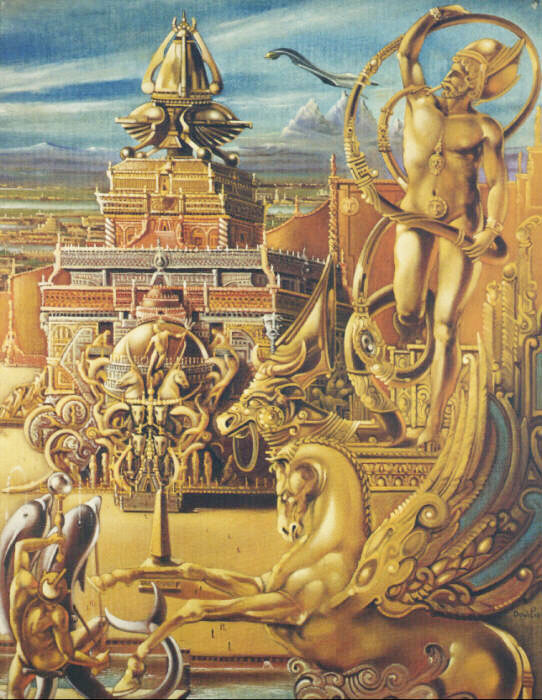 HIS DRAMATIC MOUNTAIN TRIP
HIS DRAMATIC MOUNTAIN TRIP
“…Filled with such reflections as these, I climbed yet higher towards the top of the sky-piercing peak, near the apex of which I stood, for the dawn was not far distant, and I must be. on the highest stone to greet Incal (the sun) when He conquered Navaz, else He–chief of all the manifest signs of the great and only true God, whose name He bore, whose shield He was–might not favorably regard my prayer. No, He must see that the supplicating youth spared no pains to do Him honor, because it was for this purpose only that I had climbed alone, amidst these solitudes, up that trackless steep of snow, beneath the starry dome of the skies.
*
Over these mountains, indeed not two miles from the base of my treasure peak, wound the emperor’s highway to the great ocean, hundreds, of miles away on the other side of the Caiphalian plains….This, was the sole method of reaching the summit of the highest mountain of Poseid, or Atlantis, as thou callest the island-continent.
*
on their belief: “…So with my belief in Incal, a belief shared by my country-people. Incal was a purely spiritual conception, and aside from the Eternal Cause..”
*
When he was just on this mountain a volcanic eruption happened and lasted for a while. Afterwards a gray dust covering all.
This eruption opens up the crust many places and so he discover a gold and silver-ore. He tries to make it his own, but when revealing this to some partners – they betray him.
*
From CHAPTER II-“CAIPHUL” page 41:
The Atlantean people lived under a government having the character of a limited monarchy. Its official system recognized an emperor (whose position was an elective one, and not in any sense hereditary) and his ministers, known by a name signifying “The Council of Ninety,” and also known as “Princes of the Realm.” All of these officers had a life-tenure in office, except in cases of malfeasance, which term was strictly defined and its provisions severely enforced; and from the operation of the law relating thereto, no exaltation of position was sufficient to secure exemption for offenders. No governmental positions were made elective, with the exception of one ecclesiastical office.
*
ART AND DECORATING WITH SERPENT-FIGURES:
BOOK describes a building …”..a quadrangle in the steps, and the next, another serpent, and so around the building. This to give an idea of the tremendous parallelogram, encompassed with steps, guarded by monstrous ornamental, as well as useful, serpent forms, religious emblems, signifying not alone wisdom but also the appearance of a fiery serpent in the skies of the ancient earth, initiating the event of the separation of Man from God.”
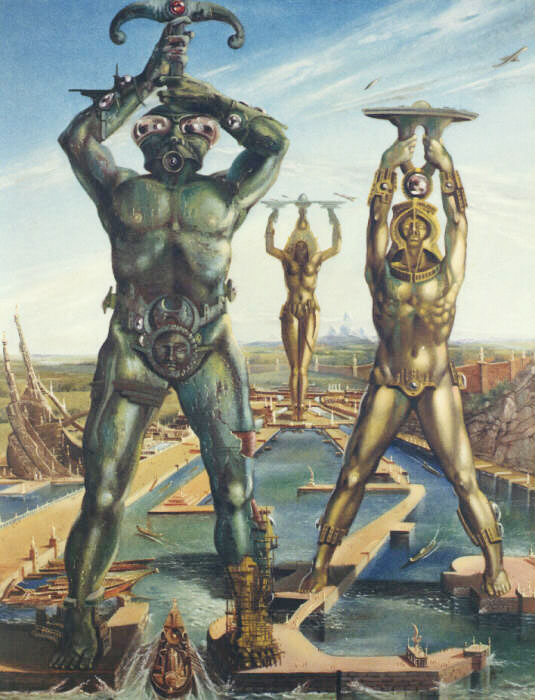 MORE descriptions on the Atlantean governmental buildings:
MORE descriptions on the Atlantean governmental buildings:
“Springing from the main roof of the palace arose graceful spires and towers, while the many jutting apartments, angles and groined arches, flying buttresses, cornices and multifarious architectural effects prevented any apparent heaviness in the design. Around the largest of the towers there extended from (p.44) bottom to top a winding staircase, conducting to the rail-enclosed space on its summit, one hundred feet above the aluminum sheathing or roofing-plates of the palace.
*
STONE-CUTTING EQUIPMENT:
“…else we possessed peculiarly efficient stone-cutting machinery. This latter is the correct assumption, for our machinery for that purpose, like an almost infinite variety of other implements for every sort of service, was our pride amongst the nations. Let me here make an assertion, not for argument but to be understood in the light of subsequent chapters, namely, that if we as Atlanteans had not possessed this wide range of mechanical inventions and the inventive talent which gave us these triumphs, then neither would (p45) ye of this modern day have possession of a like creative ability, nor of any of the results of such genius.
*
Atlantis or Poseid as I (rø’s interpretation of the text) understand it – is here described as it was:
“nine thousand years before the waters of the ocean engulfed our fair land and left no sign” – it means ca 9000+12500 = 21500 years ago.
“nothing was left of those two cities hidden away beneath the ocean, lava and ashes”
Caiphul, the Royal City, the greatest of that ancient day; “had a population of two million souls”
*******
In preceding pages the promontory of Caiphul was described as reaching out into the ocean on a peninsula from the Caiphalian plain and as visible from a great distance at night because of the glow of light from the capital. For three hundred miles westward from Numea the peninsula projected outwards from the plain, averaging almost to its extreme cape – a breadth of fifty Miles and rising much like the chalk-cliffs of England directly from the ocean to a height of nearly one hundred feet, to reach a plain almost floor-like in its evenness. On the point of this great peninsula was Caiphul or “Atlan, Queen of the Wave.” Beautiful, peaceful, with its wide spreading gardens of tropical loveliness.
 “Beautiful, peaceful, with its wide spreading gardens of tropical loveliness, its broad avenues shaded by great trees, its artificial hills, the largest surmounted by governmental palaces, and pierced and terraced by, the avenues which radiated from the city-center like spokes in a wheel. Fifty miles these ran in one direction, while at right angles from them, traversing the breadth of the peninsula, forty miles in length, were the shortest avenues. Thus lay, like a splendid dream, this, the proudest city of that ancient world.”
“Beautiful, peaceful, with its wide spreading gardens of tropical loveliness, its broad avenues shaded by great trees, its artificial hills, the largest surmounted by governmental palaces, and pierced and terraced by, the avenues which radiated from the city-center like spokes in a wheel. Fifty miles these ran in one direction, while at right angles from them, traversing the breadth of the peninsula, forty miles in length, were the shortest avenues. Thus lay, like a splendid dream, this, the proudest city of that ancient world.”
At no point did Caiphul approach the ocean nearer than five miles. Though it had no walls, around the whole city extended a huge moat, three-quarters of a mile broad by an average of sixty feet in depth and supplied by the waters of the Atlantic. On the north side, a great canal entered the moat-a canal in which the outflowing waters of a large river, the Nomis, created an outgoing current of considerable swiftness. A current was thus naturally made to cause suction through the entire circle of the moat, of which the ocean supply entered at an ingress on the south side. The old mouth from A. old days, was ca 200 km long around the city.
In this manner efflux into the sea of all the drainage of the artificial circular island on which stood the city was allowed. Immense pumping engines forced fresh ocean water through large stone pipes and conduits all over the city, flushing the drains, furnishing motive power for all requisite purposes, for electric (p47) fighting and electric services of vast variety–but enough.
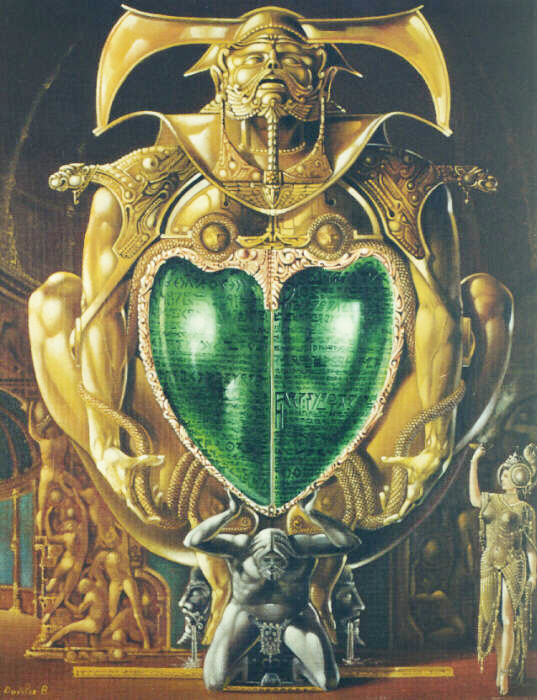 THEY HAD ELECTRIC POWER ON ATLANTIS!
THEY HAD ELECTRIC POWER ON ATLANTIS!
Electric service? Electric power? Indeed we had deepest knowledge of this motor-force of the universe; we used it in countless ways which have yet to be rediscovered in this modern world of ours, and ways, too, which are every day coming more and more into recollection as men and women of that past age reincarnate in this.
“We drew our electrical energies partly from the waves beating the ocean shores, more largely from the rise and fall of the tides; from mountain torrents and from chemicals; but chiefly from what might aptly be termed the “Night-Side of Nature.” High-grade explosives were known to us, but our employment of them was of much wider range than thine. If thou couldest cause them substances gradually to yield up their vast imprisoned force without fear of an explosion, thinkest thou that thy machinery would long be propelled by clumsy, because ponderous, steam or electric engines? (“imprisoned force” – may be this statement aim of a kind of fission or fusion power-because it was apparently of small size, as he says it could be “carried in a handbag” rø.rem)
He also says they had “Night-Side forces”.
*
The original object for which the great moat encircling the capital was excavated, had, since long centuries, been fulfilled. That purpose was purely maritime, in the days when ships had been used as carriers, before the later general use of aerial vessels; and it had served this purpose in such stead as to win for Caiphul its proud title “Sovereign of the Seas,” a name retained even when the original uses of its moat had become a matter of history.
When the better means of transportation had supplanted the old, then the ships, which for ten centuries bad graced all the seas and waterways of the globe, had been suffered to decay or had been converted to other uses. Only, a few sails now roved the waters, and those were merely pleasure craft belonging to novelty-loving people of leisure, who thus indulged their taste for sport.
*
He says they had ended sea-freight-travel 700 years ago.
*
A marked feature of Caiphul was the wealth and rare beauty of its trees and tropical shrubbery, lining the avenues, covering the multitudinous palace-crowned hills, many of which had been constructed to rise two or even three hundred feet (70-100m)above the level of the plain
*
ON LIGHT SOURCES; “tubes of crystal, absolutely exhausted of air, gave a continuous light derived from the “Night-Side” forces.”
*
THE Atlantean house-building-traditions was to avoid ugly and angular houses.
*
Museums of art, edifices for histrionic entertainment and other structures not designed for habitation were also in tasteful numbers.
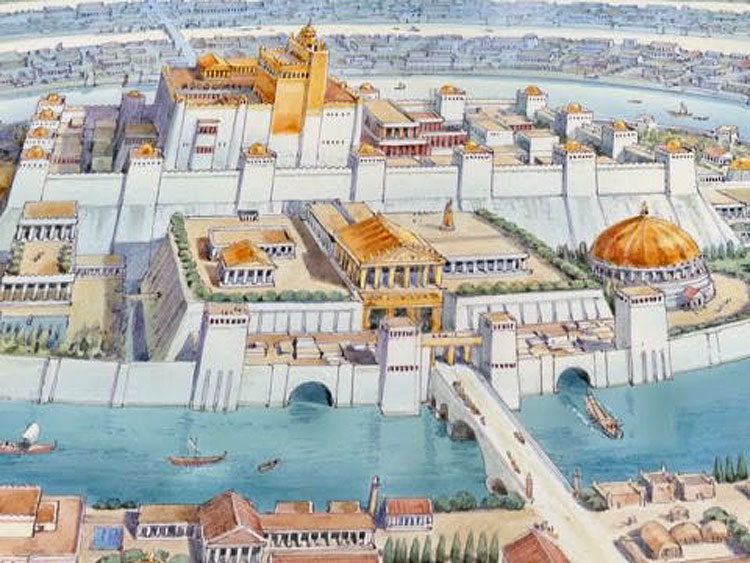 OWNERSHIP ON ATLANTIS: THE SOCIETY OWN IT ALL.
OWNERSHIP ON ATLANTIS: THE SOCIETY OWN IT ALL.
“The government pursued the paternalistic principle so systematically as to have vested in itself the ownership of all the land, methods of public transit, and communications, in a word, all property.
The system was a most beneficent one, which no Poseida wanted to see disused or supplemented by any other. Did a citizen desire, a vailx (airship) for any use, he applied to the proper officials, who were on duty at numerous vailx-yards throughout the city. Or, to cultivate the land, he applied to the department of Soils and Tillage. Perhaps it was desired to manufacture some product; the machinery was for lease at the nominal rate necessary to meet working expenses and the salary of the officers overseeing that portion of the public property. Let these samples suffice. Enough, that no political harmony exists in this modern time of the world like that which sprang from this paternalism on the part of our elected officials. Governmental (p52) paternalism is a thing regarded with jealousy and semi-alarm by modem republics. But it is to-day a different quality from what it was then. Ours was a paternalism closely watched and duly checked by the suffragists (voters) of the nation, and its life was essentially exponent of true socialistic principles.
I have not even now been so precise in details as to explain many of the most peculiar adjustments maintained between the political parent and its children, nor between labor and capital. But neither can I do so in these pages with any degree of propriety, because this is not a plea for re-adoption, in this age of the world, of methods pursued in that remote period. Yet, this much I can say, not inappropriately at this juncture, that Poseid had not in my day, the modem, yet also very ancient, annoyance of labor strikes, blocking capital and enterprise, starving the artisan, and causing more suffering on the part of the poor than such annoyances can ever bring to the doors of the rich.
The secret of this immunity was not far to seek in a nation whose government was the voice of those people who possessed sufficient education to wield the power of franchise, and this, too, regardless of sex, because inborn in our national life was this principle: “An educational measuring-rod for every voter; the sex of the suffragist in immaterial.” In such a nation, and under such a government, it were strange indeed if industrial in-harmonies could long disturb social polity. The broad principle of equity between employer and employee governed in Poseid; it mattered not what a person did for another person, but the whole equation hinged on this question: Was some service performed by one person for another? If so, the fact that the service was or was not accomplished by physical labor counted for nothing. It might be equally a service deserving compensation whether it was a physical or a purely intellectual service; nor was it held to be important whether the employer represented, me or more individuals, or the employee one or more people.
Our local enactments on the subject of industrial equity were complete and rather voluminous. While I care not to give in detail a reproduction of what may be termed labor law, a (p53) few excerpts are worthy of place. It will be well to preface these with a short history of their enactment, and thus show how, in that olden time, labor troubles quite similar, and fully as menacing to peace and order as any modern industrial upheaval, were finally and equitably settled.
*
“…the government should establish a Department of Commissary, the duties of which should be to collect all statistics concerning the food products of commerce, also concerning all textile fabrics necessary for clothing and, in brief, all articles necessary for the proper social maintenance of individuals. On these statistical reports was to be founded (p55) an estimate of the cost of all such necessaries, amongst which books were reckoned as mental food, and the cost of these things for a year was calculated. Upon this calculation, day’s wages were estimated by dividing the annual cost into the number of days. This rate was decided anew every ninety days, as the cost of the chief staples was found to fluctuate, hence the rate was not wholly stable, and the wages of any given three months’ term might probably differ from those of any previous quarter.
Let me quote:
“See. VII, Art. V. Employers shall divide the gross profits of business operations upon the following plan: The wage, salary or emolument of each employee shall be paid in the sum directed by the quarterly estimate of living cost determined by the Department of Commissary. From the remainder, the amount of six parts in each hundred on the capital invested shall be set aside. This increment shall be and represent the employer’s net profits. From the remaining income the running expenses shall be deducted, and of any sum thereafter remaining, one-half shall be invested to provide annuities for sick or disabled, or assurance for the dependents of deceased employees. The remaining half shall be periodically distributed amongst the employees on. the basis of their various compensations.
“See. VIII, Art. V. The whole of a body of employees is only equal to the Superintendent thereof. The Superintendent is equal to all the underlings. Hence, employers, when not themselves managers of the business, shall pay to managers a salary equal to the combined wages of the subordinates.”
 THE RAIL-TRANSPORT-SYSTEM IN ATLANTIS- 3 meters above street level.
THE RAIL-TRANSPORT-SYSTEM IN ATLANTIS- 3 meters above street level.
“On the maps of the City Department of Transit these main and cross rails looked like the web of a garden spider. For each transit-district there were multitudes of carriages, having auto-odic mechanism, whereby they were made to speed at tremendous swiftness with their passengers; but collisions could not occur, as the conveying rods formed a double-track system.
*
“… ninety-one elective offices was in the gift of the people, while there were almost three hundred millions of Poseida in Atl and her colonies, and according to a late census which I had seen, thirty-seven, nearly thirty-eight, millions of electors held First Degree diplomas, thus entitling them to hold elective offices, disposed me to think it extremely improbable that such a high preferment would ever fall to my lot”.
*
He also mentions here that he started a study of geology and foreign languages on old Atl which he gained big advantages of in his life in USA in the 1800ths.
He comments on this: “Please not to regard this confession as due to boastfulness; it is not. I but make it in order to show thee, my friend, that thine own powers are not matters of heritage only, but recollected acquirements from some one, or it may be of all of thy past lives; also to give thee a hint of profit, to wit: that studies to-day undertaken, no matter how near to the evening of thy days, will surely bear fruit, not alone in thy present earth life, but in the experiences of subsequent incarnations also. We see with all we have seen, we do with all we have done, and we think with all we have thought”
Posted in True History of Manwith comments disabled.


